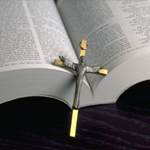HEALTHY CHANGES:
4 Steps Towards Overall Health
Step 1:
Understanding Your "Total Health"
Step 2:
Make the Commitment
Step 3:
Assessment & Goals
Step 4:
ACTION TOOL RESOURCE CENTER
![]() Mental/Emotional
Health
Mental/Emotional
Health
![]() Social
Health
Social
Health
![]() Spiritual
Health
Spiritual
Health
![]() Physical
Health
Physical
Health

Step 4: RESOURCE TOOL CENTER
Spiritual Health: Bible Study
It is said that a person who knows God’s Word is a hard person to deceive. Knowledge of God’s Word gives strength to the weary, peace to the troubled, and understanding to those seeking wisdom. But how can you know God’s Word if you haven’t studied it?
Perhaps in the past, you tried. You began reading at Genesis, and became discouraged somewhere in the middle of the “begats.” You’re not alone. Here are a few resources for more effective Bible study.
John Wesley: How to Read the Scripture
If you desire to read the scripture in such a manner as may most effectually
answer this end, would it not be advisable,
- To set apart a little time, if you can, every morning and evening for that purpose?
- At each time if you have leisure, to read a chapter out of the Old, and one out of the New Testament: if you cannot do this, to take a single chapter, or a part of one?
- To read this with a single eye, to know the whole will of God, and a fixt resolution to do it? In order to know his will, you should,
- Have a constant eye to the analogy of faith; the connexion and harmony there is between those grand, fundamental doctrines, Original Sin, Justification by Faith, the New Birth, Inward and Outward Holiness.
- Serious and earnest prayer should be constantly used, before we consult the oracles of God, seeing “scripture can only be understood thro’ the same Spirit whereby it was given.” Our reading should likewise be closed with prayer, that what we read may be written on our hearts.
- It might also be of use, if while we read, we were frequently to pause, and examine ourselves by what we read, both with regard to our hearts, and lives. This would furnish us with matter of praise, where we found God had enabled us to conform to his blessed will, and matter of humiliation and prayer, where we were conscious of having fallen short.
And whatever light you then receive, should be used to the uttermost, and
that immediately. Let there be no delay. Whatever you resolve, begin to
execute the first moment you can. So shall you find this word to be indeed
the power of God unto present and eternal salvation.
John Wesley
Preface to Explanatory Notes upon the Old Testament
EDINBURGH, April 25, 1765.
We Rely on the Bible
![]()
 We
say that the Bible is vital to our faith and life, but what exactly is the
Bible? Here are four ways to view it:
We
say that the Bible is vital to our faith and life, but what exactly is the
Bible? Here are four ways to view it:
A library
The Bible is a collection of sixty-six books, thirty-nine in the Old Testament
(or Hebrew Bible) and twenty-seven in the New Testament. These books were
written over a one-thousand-year period in three languages: Hebrew, Aramaic
(the language Jesus spoke), and Greek.
The books are of different lengths and different literary styles. In the Hebrew Bible we find legends, histories, liturgies for community worship, songs, proverbs, sermons, even a poetic drama (Job). In the New Testament are Gospels, a history, many letters, and an apocalypse (Revelation). Yet through it all the Bible is the story of the one God, who stands in a covenant relationship with the people of God.
Sacred Scripture
In early times and over many generations, the sixty-six books were thoughtfully
used by faithful people. In the process their merits were weighed, and the
community of believers finally gave them special authority. Tested by faith,
proven by experience, these books have become sacred; they’ve become
our rule for faith and practice.
In Israel the Book of Deuteronomy was adopted as the Word of God about 621 B.C. The Torah, or Law (the first five books of the Hebrew Bible), assumed authority around 400 B.C.; the Prophets about 200 B.C.; and the Writings about 100 B.C. After a struggle the Christians determined that the Hebrew Bible was Scripture for them as well. The New Testament as we know it was formed and adopted by church councils between A.D. 200 and A.D. 400.
God’s Word
We say that God speaks to us through the Bible, that it’s God’s
Word. This authority derives from three sources:
- We hold that the writers of the Bible were inspired, that they were filled with God’s Spirit as they wrote the truth to the best of their knowledge.
- We hold that God was at work in the process of canonization, during which only the most faithful and useful books were adopted as Scripture.
- We hold that the Holy Spirit works today in our thoughtful study of the Scriptures, especially as we study them together, seeking to relate the old words to life’s present realities.
The Bible’s authority is, therefore, nothing magical. For example, we do not open the text at random to discover God’s will. The authority of Scripture derives from the movement of God’s Spirit in times past and in our reading of it today.
A Guide to Faith and Life
We United Methodists put the Bible to work. In congregational worship we
read from the Bible. Through preaching, we interpret its message for our
lives. It forms the background of most of our hymns and liturgy. It’s
the foundation of our church school curriculum. Many of us use it in our
individual devotional lives, praying through its implications day by day.
However, we admit that there’s still vast “biblical illiteracy”
in our denomination. We need to help one another open the Bible and use
it.
Perhaps the Bible is best put to use when we seriously answer these four questions about a given text:
- What did this passage mean to its original hearers?
- What part does it play in the Bible’s total witness?
- What does God seem to be saying to my life, my community, my world, through this passage?
- What changes should I consider making as a result of my study?
Read More:
Upper Room Daily
Reflections
Search the Bible:
BibleGateway.com
Why Study the Bible? BibleStudy.org
Cokesbury.com
INSPIRATION CORNER

